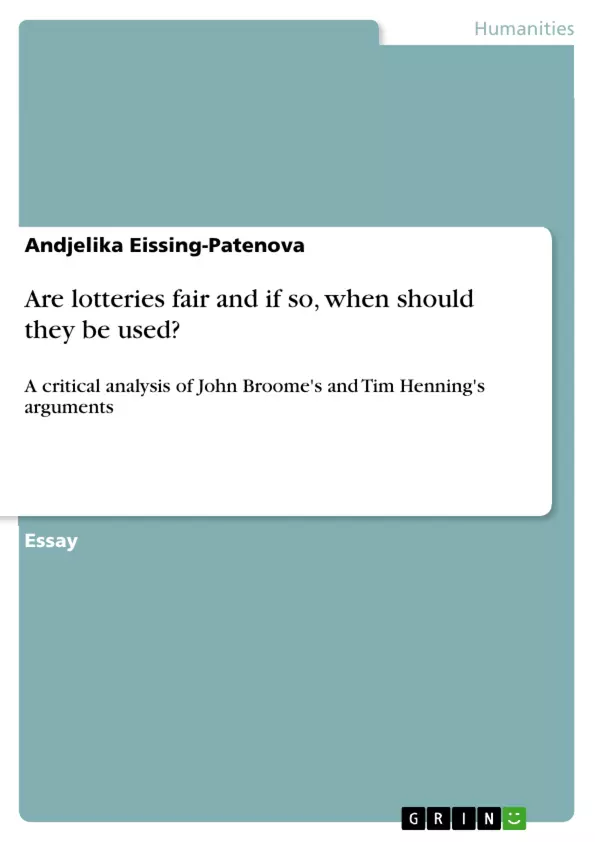How should we decide about whom to give access to medical treatment, like transplanting organs? How should study places be allocated as fairly as possible? Should only the strongest men be chosen for military service? When there are sufficient resources to satisfy all potential claimants, the implementation of allocating processes might be simple, but what does distributive justice require when resources are scarce? When should we discriminate between people, i.e. decide on the basis of special considerations, and when is it better to choose randomly? Philosophers have provided different theories of distributive justice and argue in distinct and partly conflicting manners particularly about the use of lotteries. Regarding allocation processes, this means that the allocator and the claimants do not know in advance who will receive the good and who will not. Thus, a lottery may ensure that nobody can be preferred on grounds of special considerations. This paper focuses on the question: Are lotteries fair and if so, when should they be used? An answer to this question is not only relevant for individuals and everyday-life decisions, but also in very broader terms for political, societal or economic questions concerning distributive fairness, with probably global impacts.
Inhaltsverzeichnis (Table of Contents)
- I INTRODUCTION
- II WHAT ARE LOTTERIES?
- III LOTTERIES ARE REQUIRED BY FAIRNESS: JOHN BROOME
- Fairness claims and fairness
- Fairness and the general good
- The applicability of random selection
- IV LOTTERIES ARE NOT REQUIRED BY FAIRNESS: TIM HENNING
- The surrogate satisfaction account
- V CONCLUSION
Zielsetzung und Themenschwerpunkte (Objectives and Key Themes)
This paper explores the fairness of using lotteries in allocation processes, particularly when resources are scarce. It aims to answer the question: Are lotteries fair and if so, when should they be used?
- The ethical implications of using lotteries in allocation processes
- The concept of fairness claims and their role in distributive justice
- The tension between fairness and the pursuit of the general good
- The limits of applying random selection in resource allocation
- The ethical justifications and criticisms of using lotteries in decision-making
Zusammenfassung der Kapitel (Chapter Summaries)
The paper begins by defining lotteries as allocation processes that provide equal chances for all participants, regardless of individual characteristics. It then examines John Broome's argument that lotteries are sometimes required by fairness, particularly when dealing with indivisible goods and equal fairness claims. Broome suggests that fairness claims, while not guaranteeing a right to the good, authorize individuals to be treated fairly in relation to others with similar claims. He emphasizes that fairness claims can override other considerations, such as the general good, in certain situations.
In contrast, Tim Henning argues that lotteries are never required by fairness. He criticizes the "Surrogate Satisfaction Account," which claims that lotteries provide a surrogate satisfaction by offering equal chances even when claims cannot be fully satisfied. Henning maintains that chances are not inherently valuable and therefore cannot fulfill claims.
Schlüsselwörter (Keywords)
The paper explores the ethical issues surrounding lotteries, focusing on concepts like fairness, distributive justice, fairness claims, the general good, and random selection. It analyzes contrasting viewpoints on the use of lotteries in allocation processes, particularly those of John Broome and Tim Henning.
Frequently Asked Questions
Are lotteries a fair method for distributing scarce resources?
Philosophers like John Broome argue that lotteries can be fair because they provide equal chances to all claimants when special considerations do not justify a preference.
What are "fairness claims" in distributive justice?
Fairness claims are the rights of individuals to be treated fairly in relation to others. While they don't guarantee the good itself, they authorize a fair procedure, like a lottery.
Why does Tim Henning criticize the use of lotteries?
Henning argues that lotteries are not required by fairness because "chances" are not inherently valuable and cannot satisfy a real claim to a physical good or treatment.
When is random selection considered appropriate?
Random selection is often used when resources are indivisible (like an organ transplant) and multiple people have equally strong moral or medical claims.
Can fairness override the "general good"?
According to Broome, fairness claims can sometimes override the pursuit of the general good, meaning that a fair process may be preferred even if it doesn't lead to the most "efficient" outcome.
- Citation du texte
- Andjelika Eissing-Patenova (Auteur), 2018, Are lotteries fair and if so, when should they be used?, Munich, GRIN Verlag, https://www.grin.com/document/437642



